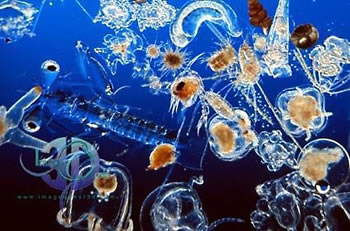Plankton  Everyone knows that sea animals or fish are full of nutrition; vitamin C, calsium, protein, taurine, EPA, DHA. Even children might know eating them is good for health. How about sea plants or plankton? Do you know that more than half of all oxygen on earth is supplied by plankton? (Most of the rest comes from tropical forests.) Plankton gives off oxygen while making foods by combining energy from sunlight with mineral from the sea water. We often associate plankton with negative images, like the root of red tide or harmful algal blooms; in fact, however, it is plankton that ocean life utlimately depends on for food. According to WHOI (Woods Hole Oceanographic Institution), most of planktons are harmless while there are a few dozen that create potent toxins given the right conditions. Remember we live on fish that eat fish that eat plankton! Trapping mosquitos I came across an article on the process by which insect vectors of diseases locate their hosts. A group of scientists are trying to find the way to control the transmission of malaria. How can it be possible? A few of the receptors are said to be specific, responding to compounds in human sweat, which plays a central role for specific transmission channels in human host-seeking behaviour. The scientists find it possible to control malaria by disrupting insect host detection or entrapping them into the trail of false odors. Isn't it cool to fool insects? (Cited from Nature) Mass Extinction of Tiny Phytoplankton 65 million years ago  Almost all the creatures on earth were wiped out by a meteor impact, annihilating even tiny phytoplankton with the clouds of debris, which blocked the sunlight that tiny phytoplankton needed to grow and poisoned them as the metal-laden dust fell to the ocean surface. More interestingly, according to a survey, extinction rates were higher in the Northern Hemisphere oceans, and diversity remained low for 310,000 years, while Southern Hemisphere oceans showed lower extinction rates and a nearly immediate recovery of norman nannoplankton populations. I just wonder what caused these difference between the North and the South. A person like me - science-challenged - can just speculate that the place of the collision greatly affected it.(Cited from Nature) |